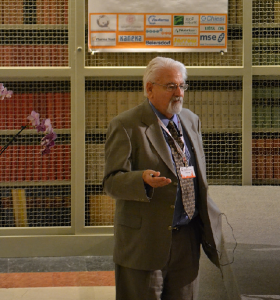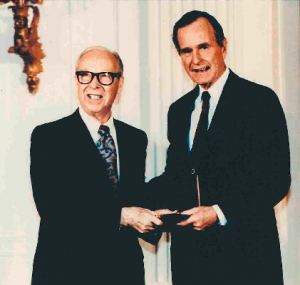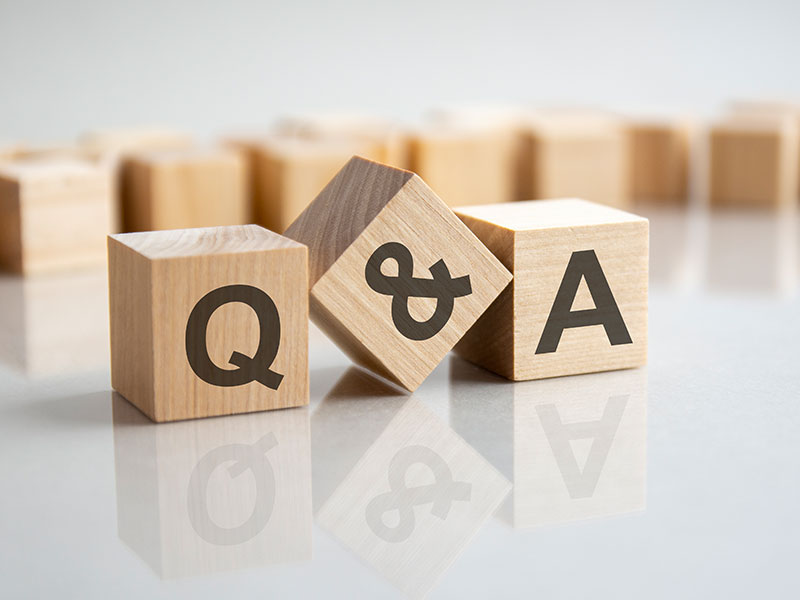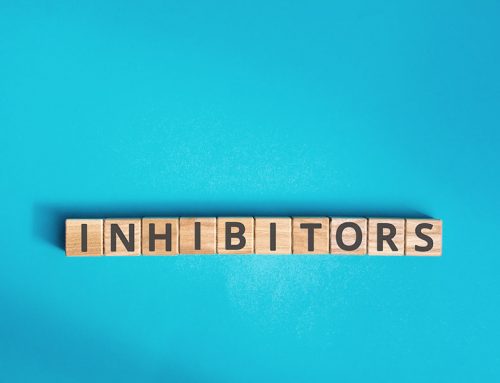
Dr. William Judy, Founder and President of the SIBR Research Institute, is one of the leading Coenzyme Q10 experts in the United States and one of the oldest. His 2007 paper on the absorption and transfer of Coenzyme Q10 is still the seminal paper on the subject. His research efforts have focused on Coenzyme Q10 and heart failure, cancer, chronic fatigue syndrome, and Prader-Willi syndrome as well as studies of Coenzyme Q10 absorption and bioavailability.
Good morning, Dr. Judy. Thank you for taking the time to answer some questions about Coenzyme Q10, the substance that your friend and colleague Dr. Karl Folkers liked to call “the essential bio-nutrient.”
Q. Why did Dr. Folkers call Coenzyme Q10 “the essential bio-nutrient,” Dr. Judy? Let’s start there.
A. Yes, and you know, I think, that Dr. Emile Bliznakov called Coenzyme Q10 the “Miracle Nutrient” and Dr. Peter Mitchell, the Nobel Prize winner, called it the “Wonder Nutrient.”
Well, Dr. Folkers was the chemist who first identified the chemical structure of Coenzyme Q10 back in the days when he was working in the Merck research laboratories. He was also instrumental in setting up clinical studies of the effect of Coenzyme Q10 supplementation on heart failure, low energy syndromes, and cancer patients.
Dr. Folkers knew that Coenzyme Q10 molecules are redox molecules. The Coenzyme Q10 molecules in their oxidized form — known as ubiquinone — are absolutely necessary for the cells’ production of ATP energy. Think how important that is for the cells in the body and especially for the heart muscle cells.
And he knew that the Coenzyme Q10 molecules in their reduced form –known as ubiquinol — are important fat-soluble antioxidants, preventing the damage that harmful free radicals and super-oxides can do. Think how important that is not only for the heart muscle cells but also for brain cells and all living tissue.
Dr. Folkers knew that our bodies begin to make less and less Coenzyme Q10 year by year once we become adults. He knew that it is practically impossible to make up for that loss by careful eating. Supplementation is absolutely necessary once people reach their middle years and senior years. I cannot stress that enough. Dr. Folkers wanted to get that message out. You would have to eat immense amounts of animal protein daily to fulfill your body needs of Coenzyme Q10.
Q. Thank you. What about the safety of Coenzyme Q10 supplements, Dr. Judy? Is there anything to worry about there?
A. Fortunately for us, given that an adequate supply of Coenzyme Q10 is essential for good heart health, Coenzyme Q10 supplements are very safe. The big difference between the Coenzyme Q10 supplements on the market in the USA is not in their safety – they are safe – but rather in what the supplement formulators put into their Coenzyme Q10 formulations.
Different formulations result in different absorption rates. For example, in the early days of soft-gel formulations, some companies put poly-ethylene glycol (PEG — it was also used in anti-freeze) in Coenzyme Q10 products. The idea was that PEG would act as a wetting agent, thus making the Coenzyme Q10 crystals dissipate throughout water solutions. Companies made claims that these products were both lipid and water soluble. They were not water soluble. The PEG made the intestinal cells leaky, allowing toxins to enter the body through the absorption cells. PEG is still being used in some formulations but in lesser concentrations. Today, other wetting agents (Poly-Sorbate 80 and Sorbitol) are being used in many Coenzyme Q10 formulations.
For Coenzyme Q10 to be effective at the cellular level, it must first be absorbed from the intestines and then enter the body cells. Almost all lipid based soft-gel formulations of Coenzyme Q10 are poorly absorbed (< 3.0%). The newest type of Coenzyme Q10 product in the USA market is the crystal-free formulation. This formulation has an absorption rate of up 8% of a 100 mg dose.
The need for this type of formulation exists because the body cannot absorb crystals, and the Coenzyme Q10 crystals will not completely dissociate to single molecules at body temperature. Complete dissociation of the Coenzyme Q10 crystals occurs at 10 degrees centigrade above body temperature.
Thus, the absorption depends on the individual supplement manufacturer’s formulation of the Coenzyme Q10 supplement. Without a good formulation, you will not get good absorption, and without good absorption, you will not get good heart health benefits and other health benefits from the supplement.
Daily dosage? Well, studies show that Coenzyme Q10 is safe up to 2400 milligrams per day for long periods. But hardly any of us need that much Coenzyme Q10. Healthy elderly people achieved good results with 200 milligrams per day – 100 milligrams taken twice daily with meals – in the Swedish KiSel-10 study.
And heart failure patients benefited from 300 milligrams per day – 100 milligrams taken three times a day with meals – in the international Q-Symbio study. Both of these studies have been published in reputable journals, by the way.
But, what should I say? People in their 30s and 40s and up and from then on will surely benefit from taking at least 50 or 100 milligrams of Coenzyme Q10 daily.

Dr. Karl Folkers, 1906-1997, was a research chemist who counted the isolation of Vitamin B12 and the determination of the chemical structure of Coenzyme Q10 among his important contributions to science. For his accomplishments, Dr. Folkers was elected to the National Academy of Sciences, and he was awarded the President’s National Medal of Science, and the Priestley Medal of the American Chemical Society.
Q. If we could stay with this safety topic just a bit longer, are there any groups of people who should not take Coenzyme Q10 supplements?
A. Hmmm, interesting question. What comes to mind? Well, there are many people out there who are taking blood thinning medications. Coenzyme Q10 has been shown to be safe for patients taking Coumadin (warfarin).
And Coenzyme Q10 should be safe for patients on the newer blood thinning medications. But, of course, patients on blood thinning medications should always talk to the physician about taking supplements.
I myself have continued to take Coenzyme Q10 while I have been on the blood thinner Pradaxa and/or Coumadin. No problem. The Coumadin can be easily reversed in case of excessive bleeding or the need for surgery. The Pradaxa cannot be rapidly reversed.
What else? There are a lot of people with diabetes out there. There, too, the research shows that Coenzyme Q10 supplements are safe for people with diabetes, both type 1 and type 2.
That is a good thing. People with diabetes can get the heart health benefits from taking daily Coenzyme Q10 supplements.
Q. Thank you, Dr. Judy. What about drug interactions? Any concerns there?
A. Ah, yes, a very big concern. Statin medications. The statin medications are very effective at lowering blood cholesterol levels, no doubt about it. But … a big but here … statins medications also cut off the body’s own production of Coenzyme Q10. Coenzyme Q10 is produced in the same biological pathway as cholesterol is. Cut off one, you cut off the other.
So, definitely, people taking statin medications will want to talk with their cardiologists about taking a good Coenzyme Q10 supplement. The evidence is there in the research studies.
Beyond statins … hmmm … Dr. Ross Pelton, the natural pharmacist, has written about many other drugs that inhibit the production or absorption of Coenzyme Q10. It is rather alarming how many different drugs can affect Coenzyme Q10 negatively. I think the number is greater than 150.
Another drug interaction with Coenzyme Q10 is from the chemotherapy drugs. Many of these drugs have a toxic effect on the heart. Coenzyme Q10 supplementation will prevent the cardio-toxicity of chemotherapy drugs. Coenzyme Q10 will also reduce the adverse side effects of these drugs.
Now, do I know of any drugs that would have a diminished effect because the patient is taking Coenzyme Q10 supplements? No. The problem is the other way around. Many drugs interfere with the Coenzyme Q10.
And, remember, we started this talk by saying what an important role Coenzyme Q10 plays in the body in terms of cellular energy production and antioxidant protection of the cells. It occurs to me, there is a third benefit to taking Coenzyme Q10 supplements.
A contemporary of mine, Dr. Gian Paolo Littarru, has published research showing that Coenzyme Q10 improves endothelial function. The endothelium, that is the name for the lining of cells on the inside of blood vessels, the very place we do not want atherosclerosis to develop, right?
Q. Thank you, Dr. Judy, for sharing this information with us. Perhaps we can talk more another time about the health effects of Coenzyme Q10 supplements?
A. Yes. It worries me that such an important substance as Coenzyme Q10 is relatively little known and understood in the United States. Think of the difference in the quality of life that Coenzyme Q10 supplements can make.
References
Alehagen, U., Johansson, P., Björnstedt, M., Rosén, A., & Dahlström, U. (2013). Cardiovascular mortality and N-terminal-proBNP reduced after combined selenium and Coenzyme Q10 supplementation: a 5-year prospective randomized double-blind placebo-controlled trial among elderly Swedish citizens. International Journal of Cardiology, 167(5), 1860-1866.
Folkers, K., Brown, R., Judy, W. V., & Morita, M. (1993). Survival of cancer patients on therapy with Coenzyme Q10. Biochemical And Biophysical Research Communications, 192(1), 241-245.
Judy, W. V., Stogsdill, W. W., Judy, D. S., & Judy, J. S. (2007). Coenzyme Q10: Facts or Fabrications? Natural Products Insider. Retrieved from http://www.zmc-usa.com/docs/CoQ10_Facts_or_Fabrications.pdf.
Mortensen, S. A., Rosenfeldt, F., Kumar, A., Dolliner, P., Filipiak, K. J., Pella, D., & Littarru, G. P. (2014). The effect of coenzyme Q10 on morbidity and mortality in chronic heart failure: results from Q-SYMBIO: a randomized double-blind trial. JACC. Heart Failure, 2(6), 641-649.
Pelton, R. (2001). Drug-induced Nutrient Depletion Handbook. Hudson, OH: Lexi-Comp.









[…] Good morning, Dr. Judy. You have talked with us about the safety of Coenzyme Q10 supplements, and you have told us that the formulation of the supplement is decisive for the absorption of […]